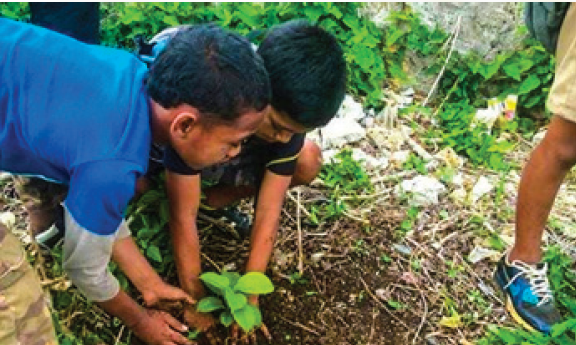PAPP KRA/Indicator
KRA 3 – Contribute to agricultural enterprise development through improved market linkages
Indicator 1 – At least 10 technical exchanges between farmer organisation and private sector by end of project.
Country/s
Papua New Guinea, Fiji, Solomon Islands, Tonga, Samoa
Background/Context
Soils are an important limited natural resource that are becoming increasingly recognised for their important role in human and ecological health. The projected increases in food, fibre, and fuel production required to achieve food and energy security will place increased pressure on the soil in coming years.
Particular issues affecting soils in the Pacific region include poor nutrient and water management; a need for capacity building and training; land degradation (especially erosion); and appropriate use of agricultural inputs. In general there is a lack of knowledge across the region on the importance, interrelations and the vital role of soil.
Farmers and farmer organisations are beginning to recognise that they have to take ownership of agricultural developments and foster greater understanding of the value of good farming practices – particularly on soil management. The Pacific Soil Learning Exchange has set the foundation for a way forward in this regard.
Brief outline of intervention
The Pacific Farmers Soil Learning Exchange, held on Taveuni island, Fiji, and hosted by farmer organisations Tei Tei Taveuni and the Tutu Rural Training Centre, was one of the Pacific Island Farmers Organisation Network’s (PIFON) flagship activities during the International Year of Soils 2015. The exchange was supported by the Pacific Agriculture Policy Project, in partnership with the IFAD funded MTCP II program, the Fiji Ministry of Agriculture, the Pacific Soils Partnership, and other stakeholders.
The forum provided a platform for farmers, extension workers, and soil scientists to exchange experiences and information on the importance of healthy soils, implement sustainable soil management, and good farming practices to ensure sustainability of production thus improving rural livelihoods.
Impacts
There were a number of key soil issues addressed during the week – how certain farming practices in the past have damaged the soil, sharing of sustainable soil technologies – the need for farmer-led research, the introduction of new biological initiatives such as mucuna beans, and new technologies and methods that could transform Pacific agriculture to ensure it is both sustainable and commercially productive.
The meeting set the platform for a concerted effort towards educating Pacific farmers, and the wider Pacific public, about nurturing healthy soil with emphasis placed on taking this campaign to a wider audience.
Farmers organisation representatives who attended the exchange have taken the information learned and practices experienced on Taveuni and are applying them in their own contexts.
For example:
PAPUA NEW GUINEA WOMEN IN AGRICULTURE
A week long training on Soil Health, Plant Health & Human Nutrition took place on July 25th-29th, 2016 in Mutzing, Markham District, Morobe Province, Papua New Guinea.
The lead trainer was Peter Linibi from PNG WiADF, who shared his own expertise in this area, as well as learnings from his attendance at the PIFON Soils Learning Exchange on Taveuni in 2015. Peter challenged the 20 interested attendees, emphasising the importance of balancing the soil before planting crops, being conscious of plant health, and taking care of one’s digestive system and diet.
Various methods and techniques for maintaining healthy soil in the region were shared –with a focus on ensuring a healthy and productive food system and improving rural livelihoods.
‘Take care of the soil and it will take care of the plants and human. Abuse it, and when the soil dies, it will take humanity with it’, was the key message received.
Participants expressed their appreciation of the information they gained and that they now have a change in their perception towards soil health, plant health and human nutrition.
SAMOA FARMERS ASSOCIATION
During the Soil Learning Exchange, participants from the Samoa Farmers Association (SFA) were particularly impressed with the experiences of Taveuni taro farmers who were using mucuna bean (Mucuna pruriens) for increasing soil fertility, supporting improvements in organic matter and soil structure, and helping with weed suppression particularly during the fallow period. Watch video.
Subsequently SFA were able to obtain some mucuna beans in Samoa and have been growing them for several generations to increase the seed supply in the country. Plans are underway for field trials to be conducted with SFA farmers under local conditions, with a view to producing easy-to-use guidelines for mucuna in Samoa.
A publication from the event was produced (Soil Learning Exchange Booklet) and distributed to PIFON members and an event video.





CONNECT WITH US